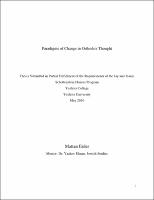Please use this identifier to cite or link to this item:
https://hdl.handle.net/20.500.12202/4159| Title: | Paradigms of Change in Orthodox Thought |
| Authors: | Erder, Mattan |
| Keywords: | Jewish law --Philosophy. Jewish law --Interpretation and construction. Jewish law --Methodology. Orthodox Judaism --History. Rabbinical literature --History and criticism. Authority --Religious aspects --Judaism. |
| Issue Date: | May-2010 |
| Publisher: | Yeshiva College |
| Abstract: | The analysis of halakha (Jewish Law) in a historical and academic setting is often perceived as a challenge to Orthodox Judaism. This challenge arises as historians study the rich and varied history of halakha, they uncover apparent shifts and evolution in its practice, understanding and interpretation. These shifts are interpreted by historians with reference to the relevant economic, social, political, and other contextual factors that are seen to have influenced the legal reasoning or behavior in question. The very existence of historical change in halakhic practice throughout the generations tend to undermine Orthodox belief in the continuity of the mesorah (tradition), and are used by liberal movements as precedents to justify radical changes in Jewish life and practice. The difficulty for Orthodox Jews is compounded when the interpretation of these changes seems to reveal that outside, contingent factors play a large role in determining the halakha in each time and place. Halakha is understood by Orthodox Judaism as being divine law, and this belief clashes with the notion that mundane factors could play a role in influencing the way that halakha and halakhists operate. |
| Description: | The file is restricted for YU community access only. |
| URI: | https://hdl.handle.net/20.500.12202/4159 https://ezproxy.yu.edu/login?url=https://repository.yu.edu/handle/20.500.12202/4159 |
| Appears in Collections: | Jay and Jeanie Schottenstein Honors Student Theses |
Files in This Item:
| File | Description | Size | Format | |
|---|---|---|---|---|
| Mattan-Erder.pdf Restricted Access | 934.67 kB | Adobe PDF |  View/Open |
This item is licensed under a Creative Commons License

